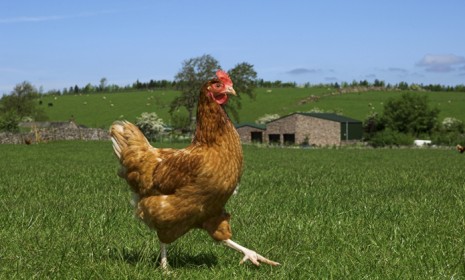Burger King's shift to cage-free eggs: A game-changer?
The massive fast-food chain promises to offer more humanely produced food. Is this a tipping point in the movement toward better treatment of livestock?

Burger King is winning praise from animal-rights activists after announcing Wednesday that by 2017 it will only buy eggs and pork that come from cage-free animals. Currently, just 9 percent of the chickens that produce BK's eggs and 20 percent of its pigs are cage-free. "Many tens of thousands of animals will now be in better living conditions," says Wayne Pacelle, president of the Humane Society of the United States. Burger King is the world's second-biggest fast food chain, so the shift is expected to expand the market for humanely produced food and pressure rivals to follow suit. Is this a "game-changer"?
This will revolutionize the industry: Burger King uses hundreds of millions of eggs every year, says Bruce Kennedy at Green Biz. And now the chain will be a huge customer for cage-free farms. It can cost an extra 40 cents to produce a dozen cage-free eggs now, but thanks to the economies of scale that will come with Burger King's business, those costs should fall, making "it easier for other restaurants to buy them, too."
"Burger King goes cage-free: What it means for egg suppliers"
The Week
Escape your echo chamber. Get the facts behind the news, plus analysis from multiple perspectives.

Sign up for The Week's Free Newsletters
From our morning news briefing to a weekly Good News Newsletter, get the best of The Week delivered directly to your inbox.
From our morning news briefing to a weekly Good News Newsletter, get the best of The Week delivered directly to your inbox.
But it will barely benefit chickens: This feel-good move is mostly an attempt to "win over consumers," says Hanna Brooks Olsen at Blisstree, and grab customers back from McDonald's, which beat Burger King to the punch by getting rid of inhumane gestational crates for its sows. Unfortunately for laying hens, the "'cage-free' label is basically meaningless." Many cage-free birds are still kept in crowded, dark barns, and never see the light of day. This is a "half-measure," at best.
"Burger King pledges to go 'cage-free' ... too bad it's a meaningless label"
It's no cure-all. But it's an improvement: Eliminating cages "isn't guaranteeing cruelty-free conditions," says Robin Shreeves at Mother Nature Network, but it's a "step in the right direction. After all, many cage-free hens are starved and have part of their beaks burned off. Still, they have it better than other chickens. They can at least spread their wings, and lay their eggs in nests. Let's hope the applause over this move inspires other fast-food chains and Burger King to continue making humane changes.
"Burger King pledges to use cage-free eggs. What does that mean?"
A free daily email with the biggest news stories of the day – and the best features from TheWeek.com
-
 Farage’s £9m windfall: will it smooth his path to power?
Farage’s £9m windfall: will it smooth his path to power?In Depth The record donation has come amidst rumours of collaboration with the Conservatives and allegations of racism in Farage's school days
-
 The issue dividing Israel: ultra-Orthodox draft dodgers
The issue dividing Israel: ultra-Orthodox draft dodgersIn the Spotlight A new bill has solidified the community’s ‘draft evasion’ stance, with this issue becoming the country’s ‘greatest internal security threat’
-
 Codeword: December 13, 2025
Codeword: December 13, 2025The daily codeword puzzle from The Week